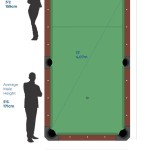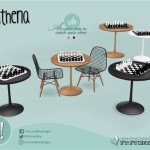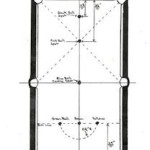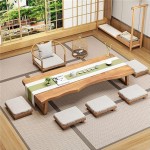The Enduring Appeal of the Real Wood Dining Table
The dining table occupies a central position in many homes, serving as more than just a surface for meals. It becomes a hub for family gatherings, celebrations, and everyday conversations. While numerous materials are available for dining table construction, real wood holds a distinctive and enduring appeal. Its natural beauty, inherent strength, and timeless quality make it a preferred choice for discerning homeowners. This article will delve into the characteristics, benefits, and considerations associated with selecting a real wood dining table, providing a comprehensive overview for prospective buyers.
Real wood, in this context, refers to solid wood derived directly from trees. This contrasts with engineered wood products like plywood, particleboard, or MDF (medium-density fiberboard), which are composed of wood fibers, particles, or veneers bonded together with adhesives. While engineered wood can offer affordability and stability, it lacks the inherent characteristics and longevity of solid wood. The grain variations, color nuances, and tactile feel of real wood contribute to its unique aesthetic value.
The selection of a real wood dining table involves considering various factors, including the type of wood, the table's style and size, and the desired finish. Each of these elements plays a crucial role in determining the table's suitability for a specific space and lifestyle. A well-chosen real wood dining table can become a cherished heirloom, passed down through generations.
Durability and Longevity
One of the primary advantages of a real wood dining table is its exceptional durability. Solid wood is a naturally strong and resilient material, capable of withstanding years of regular use. Unlike tables made from less robust materials, a real wood table is less susceptible to scratches, dents, and other forms of damage. This inherent strength translates to a longer lifespan, making it a worthwhile investment.
The density and hardness of the wood species significantly influence its durability. Hardwoods, such as oak, maple, cherry, and walnut, are generally more resistant to wear and tear than softwoods like pine or fir. The Janka hardness test is a common method for measuring the relative hardness of different wood species. A higher Janka rating indicates a greater resistance to denting and scratching.
Furthermore, the construction techniques used in building the table contribute to its overall durability. Mortise-and-tenon joints, dovetail joints, and other traditional woodworking methods create strong and stable connections that can withstand significant stress. A well-constructed real wood dining table will exhibit minimal movement or wobbling, even after years of use.
Proper maintenance also plays a vital role in preserving the durability of a real wood dining table. Regular cleaning with a soft cloth and appropriate furniture polish can help protect the finish and prevent the buildup of dirt and grime. Promptly addressing spills and stains is essential to prevent permanent damage to the wood. With proper care, a real wood dining table can maintain its beauty and structural integrity for decades.
Aesthetic Appeal and Natural Beauty
Beyond its durability, real wood is prized for its inherent aesthetic appeal. The natural grain patterns, color variations, and unique character marks of each piece of wood contribute to its distinctive beauty. No two real wood dining tables are exactly alike, making each one a unique and individual work of art. This natural variation adds warmth, texture, and visual interest to any dining space.
The choice of wood species significantly impacts the table's aesthetic. Oak, with its prominent grain patterns and warm tones, is a popular choice for traditional and rustic styles. Maple, with its smooth texture and light color, offers a more contemporary and versatile look. Cherry, renowned for its rich reddish-brown hue and elegant grain, adds a touch of sophistication. Walnut, with its dark color and intricate grain patterns, exudes a sense of luxury and refinement.
The finish applied to the wood further enhances its aesthetic appeal. A variety of finishes are available, ranging from clear coats that highlight the natural beauty of the wood to stains that alter its color and tone. Oil-based finishes penetrate the wood, providing protection from within, while polyurethane finishes create a durable surface layer. The choice of finish should complement the wood species and the desired aesthetic of the dining space.
Furthermore, the design of the table itself contributes to its overall aesthetic. From simple and minimalist designs to elaborate and ornate styles, real wood dining tables are available in a wide range of shapes, sizes, and configurations. The table's legs, edges, and other details can be carefully crafted to create a cohesive and visually appealing piece of furniture.
Sustainability and Environmental Considerations
Increasingly, consumers are considering the environmental impact of their purchasing decisions. Real wood, when sourced responsibly, can be a sustainable and environmentally friendly material. Choosing wood from sustainably managed forests ensures that trees are harvested in a manner that minimizes environmental damage and promotes forest regeneration.
Certification programs, such as the Forest Stewardship Council (FSC), provide assurance that wood products come from responsibly managed forests. FSC-certified wood is harvested according to strict environmental and social standards, ensuring that the forest ecosystem is protected and that workers are treated fairly.
Furthermore, real wood is a renewable resource. Unlike synthetic materials that are derived from fossil fuels, wood can be replenished through reforestation efforts. Sustainable forestry practices involve planting new trees to replace those that are harvested, ensuring that the forest resource remains available for future generations.
In addition to its sustainability as a raw material, real wood can also contribute to a healthier indoor environment. Wood is a natural material that does not emit harmful chemicals or volatile organic compounds (VOCs), unlike some engineered wood products that may contain formaldehyde or other potentially harmful substances. Choosing a real wood dining table can help improve indoor air quality and create a healthier living space.
However, it is crucial to be aware of "greenwashing," where companies make misleading claims about the environmental friendliness of their products. Look for credible certifications and verify the sourcing of the wood to ensure that the table is truly sustainable. Transparent supply chains and detailed product information are indicators of a genuine commitment to environmental responsibility.
Beyond the direct material considerations, the longevity of a real wood dining table also contributes to its sustainability. Because it is durable and long-lasting, a real wood table is less likely to be replaced frequently, reducing the demand for new resources and minimizing waste. Investing in a quality piece of furniture that will last for generations is a more sustainable choice than purchasing cheaper, less durable alternatives.
When disposing of a real wood dining table, consider options such as donating it to a charity or selling it to a secondhand furniture store. These options extend the life of the table and prevent it from ending up in a landfill. Alternatively, the wood can be recycled or repurposed for other projects.
Ultimately, the selection of a real wood dining table involves balancing aesthetic preferences, functional requirements, and environmental considerations. By carefully evaluating the wood species, construction techniques, finish options, and sourcing practices, consumers can make an informed decision that aligns with their values and contributes to a more sustainable future.

Solid Wood Dining Tables

Walnut Dining Table With Bench Solid Wood Kitchen Live Edge Rustik Farmhouse Dine

Sobu Oakland Designed And Handpicked Furniture

Art Of Tree Leading Solid Wood Furniture Manufacturer Malaysia

Solid Slab Wood Dining Table 8 5 Ft Length Grade Aaa Reclaimed Thai Golden Acacia Single Custom Made Straight Edge Shape Finland

Reclaimed Wood Dining Tables Benches The Bespoke Carpentry Co

Forclover Luxury Modern Ebony Solid Wood 71 In Rectangular Stone And Steel Pedestal Base Dining Table For Room Seats 8 Monmucf 09dt The Home Depot

Adria Parquet Style Solid Acacia Wood Dining Table Coku Limited

Whole High Quality Multiple Size European Modern Luxury Solid Wood Dining Table Set Wooden Furniture Room And Chairs China Made In Com

Furniture Of America Amani 78 75 In W Rectangle Natural Solid Mango Wood Dining Table With 4 Drawers Idf 51002 The Home Depot








